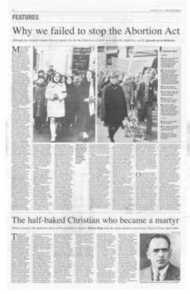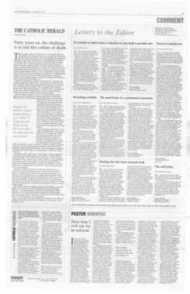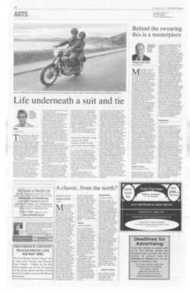Page 13, 26th October 2007
Page 13

Report an error
Noticed an error on this page?If you've noticed an error in this article please click here to report it.
Tags
Share
Related articles
What Did Graham Greene Believe?
Secret Letters Of Catholic Author Go Under Hammer
The Guilt And The Glory
Greene's 'escapes' From Boredom
Of Hell Than Of Heaven
`I'm off to light a small fire under the fool Reagan'
Graham Greene's letters reveal that late in life the writer finally reconciled the two forces that had defined his life: Catholicism and Left-wing activism, says Jim Butler Graham Greene: A Life in Letters, edited by Richard Greene, Little Brown £20 4 1 t is hard to imagine that the greater part of what Graham Greene wrote in his life remains unpublished," editor Richard Greene notes in his introduction to A Life In Letters, a well-chosen and assiduously annotated selection of the author's voluminous correspondence over a 70-year period.
Richard Greene's aim, it might be said, is to restore the human factor, to allow the author to speak for himself once more, now that the biographers have had their say.
Although much here is familiar, there is also a lot that is fresh, and if not revelatory then at least offering several new shades of Greene.
We find him in correspondence with the women who dominated his life and art — his love for his first wife Vivien and mistress Catherine Walston blooms and fades within these pages — but also with his children and grandchildren. friends and fellow writers.
A portrait emerges of a man deeply concerned — almost obsessively so, as if his own peace hinges on it — with the welfare and happiness of those about him. In an early letter to Vivien he writes: "If I ever made you unhappy really badly & hopelessly, or saw life make you like that, I'd want to die quickly."
For much of his life, it seems, Greene was at war with the commonplace and yet at the same time was its unwilling agent, as if needing those he yearned to leave behind to be content in his absence.
As the years pass and his penpateticism becomes more established, there hardly seems to be a month when he has not recently arrived back from somewhere, or was on his way somewhere, or was caught reporting from the heart of the matter: Freetown, Havana and Saigon come and go, as do countless other exotic ports of call that provided the backdrop to the best of his fiction. "How tired one is," he remarks of Sierra Leone during the war, "of plump little men in shorts with hairless legs, and drab women, and the atmosphere of Balham going gay.
Into his 80s he spent much of his time travelling, particularly in Central and South America, where he made friends with Omar Torrijos, Fidel Castro and Salvador Allende and found at last the synthesis of Catholicism and Leftwing activism that he had sought for much of his life. At 78 he casually wrote to Vivien, almost as a postscript: "Now I'm off to Nicaragua as a guest of the Sandinista government to light a small fire under the fool Reagan."
For Greene, being a writer meant getting involved, necessitated action. In a fascinating three-way correspondence with Elizabeth Bowen and V S Pritchett, he insists on the virtue of disloyalty — as befitting the headmaster's son who had to get on with the other boys, and later the Secret Service man who defended Philby when all others had cast their stones.
In one of the most powerful passages here, he writes of the novelist's task: "I met a farmer at lunch the other day who was employing two lunatics; what fine workers they were, he said; and how loyal. But of course they were loyal; they were like the conditioned beings of the brave new world. Disloyalty is our privilege. But it is a privilege you will never get society to recognise. All the more necessary that we who can be disloyal with impunity should keep that ideal alive." While the letters contain plenty of such substance, there is more still that reveals the man within. "I find it hard to swallow the canned children," he remarks mischievously to a translator at the United Nations who suggested that the Haitian regime had found new ways of doing away with its young, and to Valentina Ivasheva, one of Greene's closest friends in Russia whose husband had just committed suicide, he writes: "There is a mystery 'which we won't be able to solve as long as we are alive. Personally even when I doubt I go on praying at night my own kind of prayers. Why not try at night talking to your husband and telling him all you think. Who knows whether he mightn't be able to hear you now with a mind unclouded?"
If there is a Graham Greene who has previously been obscured it is surely here, in humour and charity (which he considered the most important virtue).
In later life he gave much of his money away, seeing that his family and friends were well cared for, often acting as agent-cum-benefactor to a number of now renowned authors. To a young Muriel Spark, for example, he sent £20 a month and a case of wine, "to take the cold edge off the charity". Although he despised John Paul 11 as a religious version of Reagan and was, like Evelyn Waugh, disappointed by the changes of the Second Vatican Council, particularly the new liturgy in English, he remained until the end deeply concerned with spiritual matters, famously describing himself as "at the worst a Catholic agnostic".
Perhaps one of the most telling remarks as Greene approached the end of what he called "this ragged business" was made to Tom Burns, editor of The Tablet. "I disbelieve in infallibility anywhere in this world," he writes. It is a testament to A Life in Letters that by allowing Greene to speak for himself he is shown not only to be extremely generous towards fallibility in others, but himself becomes far less fallible than previously suggested.
blog comments powered by Disqus

















